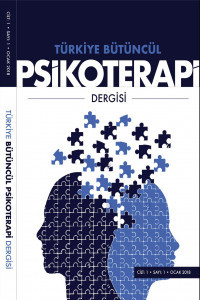Bilişsel Davranışçı Yaklaşım Çerçevesinde Cinsel İşlevsizlik: Bir Olgu Sunumu
Cinsel işlev bozukluğu vakaları oldukça yaygındır. Buna rağmen, yoksunluğun belirli yönlerinden dolayı aileler tarafından cinsel sorunlar daha az bildirilmektedir. Bu çalışmada erektil disfonksiyon ve erken boşalma sorunu olan bir çift incelenmiştir. Buna bağlı olarak cinsel sorunların yol açtığı stres, depresyon ve anksiyeteye yönelik çözüm önerileri sunulmaktadır. Belirli bir danışanın temel sorunlarını anlamak için davranışların neden ve sonuçlarını ortaya koyan bir vaka formülasyonu yapılmıştır. Seansların amacı, vaka formülasyonu oluşturulduktan sonra sorunlar için değiştirilmesi istenen noktalar hakkında farkındalık yaratmaktır. Terapötik ittifakı yeniden çerçeveleme yöntemiyle duygu ve içerik yansıtması kullanıldı. Danışanın başa çıkma becerilerini geliştiren ve ilişki sürecinde kontrol edebildiklerine odaklanmalarını sağlayan yöntemler sırasıyla önerildi. Ayrıca, danışana çatışma dinamiklerinde olumsuz döngüselliği sürdüren işlevsel olmayan çözümler anlatıldı. Danışanın kısır döngü sürecinde devam eden döngü halinden çıkabilmesi için psikoeğitim de verildi. Böylece danışanın çatışma yönetimi becerileri, iletişim becerileri ve problem çözme stratejileri açısından güçlendirildi. Tüm bunların yanı sıra cinsel işlev sağlığı, aile iletişim biçimleri ve aile birliğinin önemini hatırlatmayı amaçlayan ve farkındalık oluşmasına katkı sağlayan oturum çalışmaları ev ödevleri ile desteklendi. Dolayısıyla bu çalışma, bu gibi durumlarda tetiklemeyi kolaylaştıran uzun süreli ruminasyon olabileceğini göstermesi açısından dikkat çekicidir.
Anahtar Kelimeler:
Bilişsel davranışçı yaklaşım, cinsel işlev bozukluğu, erektil disfonksiyon
SEXUAL DYSFUNCTION IN THE FRAMEWORK OF COGNITIVE BEHAVIORAL APPROACH: A CASE REPORT
Cases of sexual dysfunction are quite common in family counseling processes. Despite this, sexual problems are less frequently reported by families due to certain aspects of abstinence. A couple with erectile dysfunction and premature ejaculation problem have been investigated in this study. Recommendations of solutions for stress, depression and anxiety caused by sexual problems are presented accordingly. To understand the main problems of a specific client, a case formulation was made that reveals the cause and effect of the behaviors. The aim of the meetings is to raise awareness on the points that are desired to be changed for the problems after the case formulation has been created. To achieve the therapeutic alliance via the reframing method, emotion and content reflection were used. Methods that improve the client's coping skills and enable them to focus on what they can "control" during the relationship process have been suggested respectively. In addition, non-functional solutions that maintain the negative circularity in conflict dynamics have been explained to the client; Psychoeducation was also provided for the client to get her out of the state of spinning around that continues during the vicious circle process. Thus, the conflict management skills of the client have been strengthened in terms of communication skills and problem-solving strategies. In addition to all these, session works have been supported with homework that aimed to remind the importance of sexual function health, family communication styles, and unity in the family and contributed to the formation of awareness. Hence, this study is noteworthy in that it shows that there may be long-term rumination, which facilitates triggering in such cases.
___
- Kemigisha, E., Ivanova, O., Ruzaaza, G.N. ve ar. (2019). Process evaluation of a comprehensive sexuality education intervention in primary schools in South Western Uganda. Sex Reprod Healthc. 21, 51–59
- Maestre-Loren, F., Castillo-Garayoa, J.A., Lopez-Martin, X. (2021) Psychological distress in erectile dysfunction: The moderating role of attachment. Sex Med. 9, 1-11
- Montorsi, F. (2005) Prevalence of premature ejaculation: A global and regional perspective. J Sex Med, 1(2), 96–102.
- Nguyen, H., Gabrielson, A.T., Hellstrom, W.J. (2017) Erectile dysfunction in young men – A review of the prevalance and risk fac- tors. Sex Med Rev. 5, 508-520
- Paul, L. (2005) Sex and the children’s book. The Lion and the Unicorn, 29(2), 222-235.
- Peixoto, M.M., Nobre, P. (2016) Distressing sexual problems and dyadic adjustment in heterosexuals, gay men, and lesbian women. J Sex Marital Ther, 42, 369–381.
- Raveendran, A.V., Agarwal, A. (2021) Premature ejaculation-current concepts in the management: A narrative review. Int J Reprod Biomed, 19(1), 5-22.
- Rijsdijk, L.E., Bos, A.E., Ruiter, R.A. ve ark. (2011). The world starts with me: a multilevel evaluation of a comprehensive sex education programme targeting adolescents in Uganda. BMC Public Health. 11(1), 334-349.
- Rosen, R.C. (2000) Prevalence and risk factors of sexual dysfunction in men and women. Curr Psychiatry Rep, 2(3), 189-195.
- Rowland, D.L., Kolba, T.N., McNabney, S.M. ve ark. (2020) Why and how women masturbate, and the relationship to orgasmic response. Journal of Sex & Marital Therapy, 46(4), 361-376 doi:10.1080/0092623X.2020.1717700.
- Simon, W., Gagnon, J. (2014) Sexual Scripts. Culture, Society and Sexuality: A Reader. Edited by Peter Aggleton, and Richard Parker. London: Routledge, pp.29-38.
- Stein, D.J., Hollander, E., Anthony, D.T. ve ark. (1992) Serotonergic medications for sexual obsessions, sexual addictions, and pa- raphilias. J Clin Psychiatry. 53, 267-271.
- Tripathi, A., Kumar, D., Kar, S.K. ve ark. (2021) Sociodemographic and clinical profile of patients presenting with erectile dysfunc- tion: experience from a tertiary care centre of North India. J Psychosexual Health, 3(3), 247-255.
- Wiederman, M.W. (2005) The gendered nature of sexual scripts. The Family Journal: Counseling and Therapy for Couples and Fa- milies, 13, 496–502.
- Zerach, G., Anat, B.D., Solomon, Z. (2010) Posttraumatic symptoms, marital intimacy, dyadic adjustment, and sexual satisfaction among ex-prisoners of war. J Sex Med. 7, 2739–2749.
- ISSN: 2587-2702
- Başlangıç: 2018
- Yayıncı: Psikoterapi Enstitüsü
Sayıdaki Diğer Makaleler
Beyza ATEŞ, Ramazan Çağlar ERCEN
Aysun AKTAŞ ÖZKAFACI, Nilay NALÇA, Nurhan EREN
COVID-19 Pandemisi Sırasında Bir Grup Adölesanda Algılanan Stresin Değerlendirilmesi
Berna GÖKKAYA, Serpil KIZILTAŞ GÜNYÜZ, Betul KARGUL
Otizm Spektrum Bozukluğu Tanılı Çocukların Ebeveynlerinde Duygu Düzenleme: Bir Model Önerisi
Bilişsel Davranışçı Yaklaşım Çerçevesinde Cinsel İşlevsizlik: Bir Olgu Sunumu
